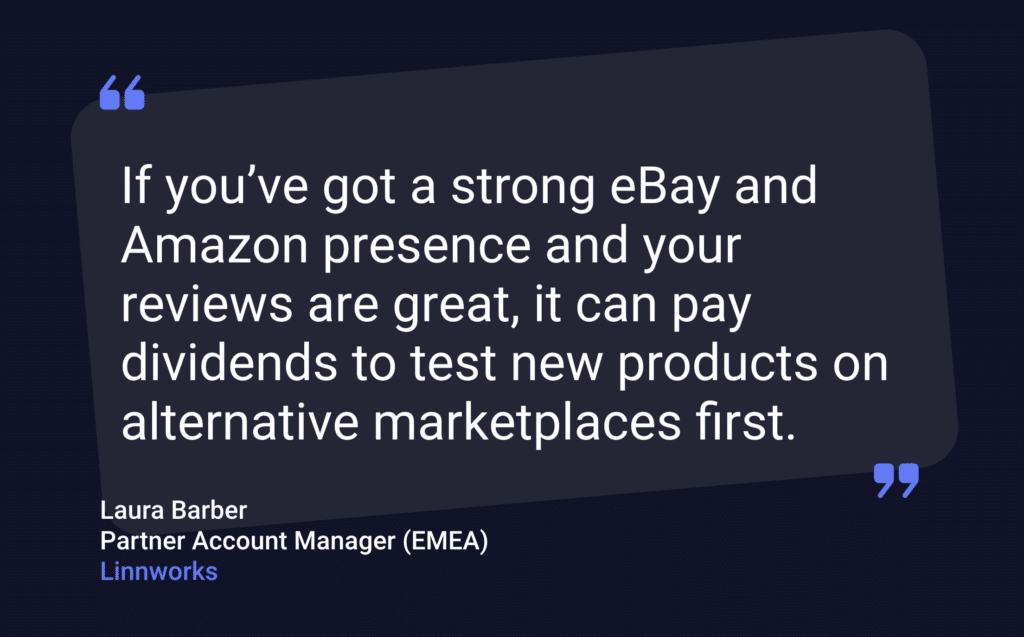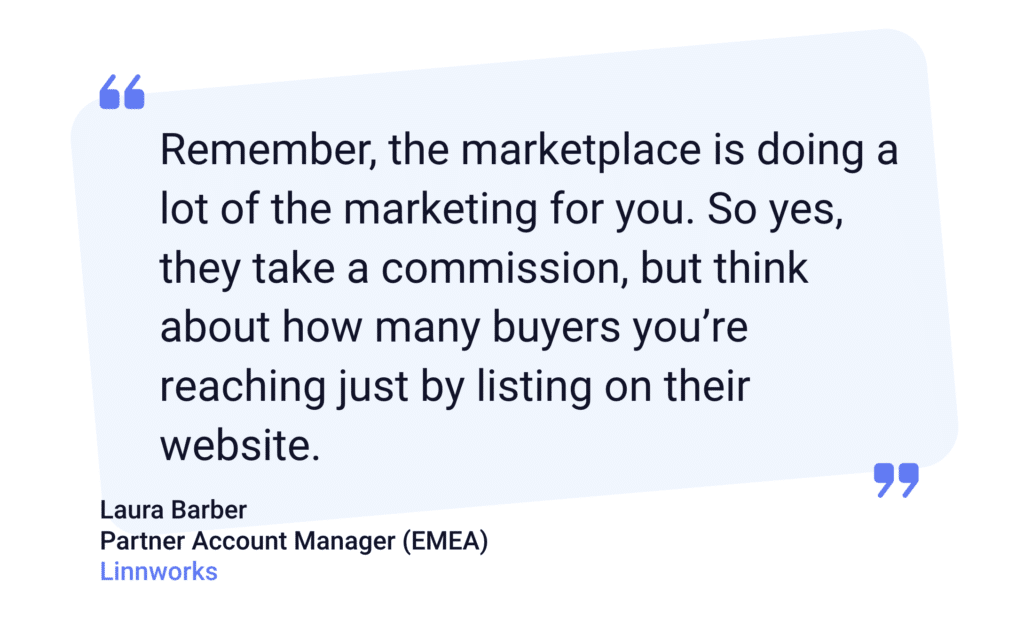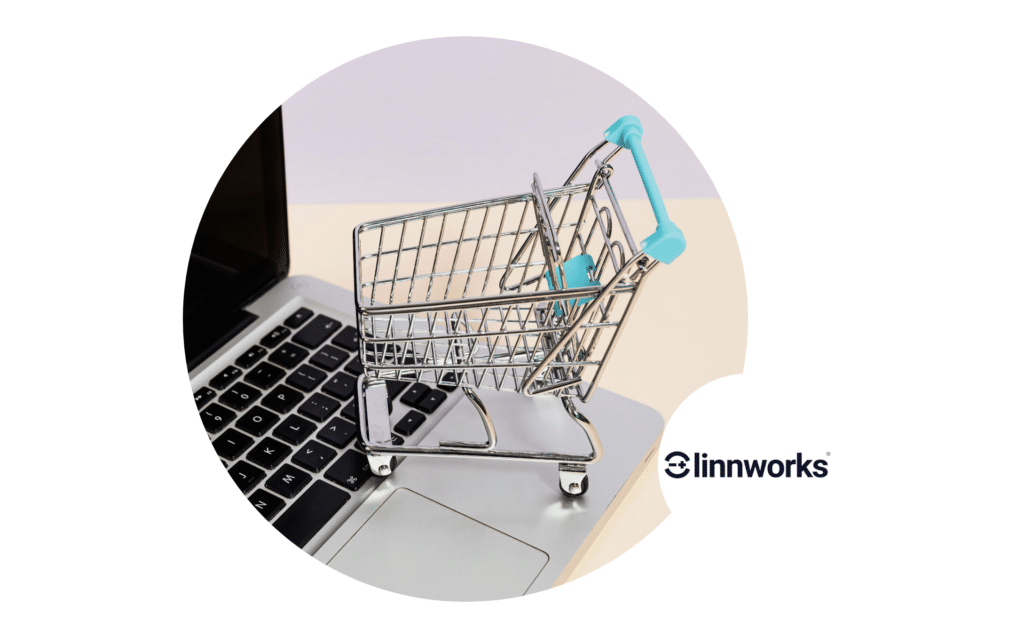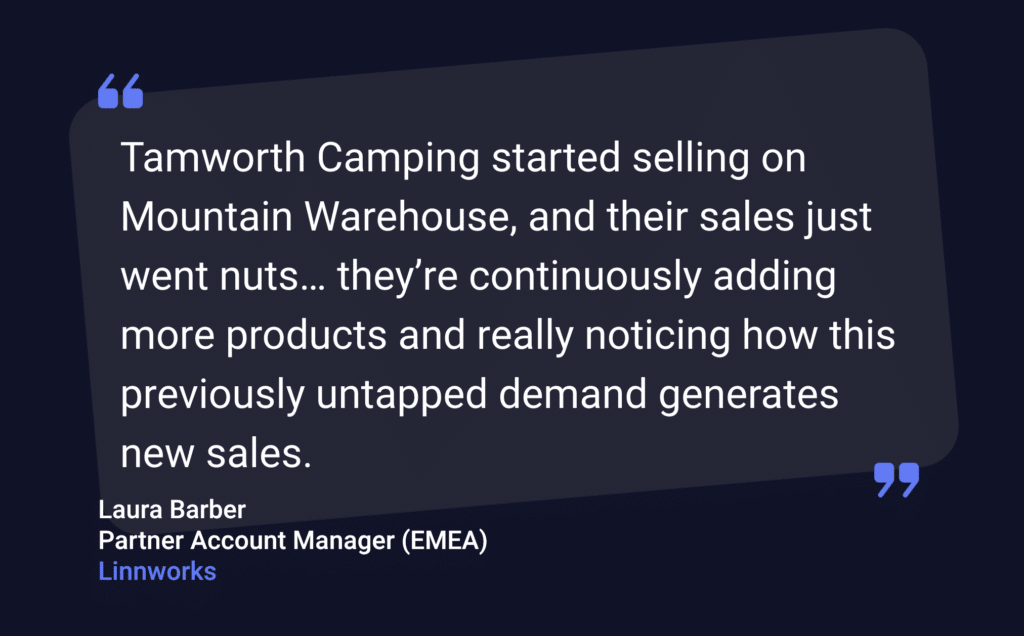Beyond eBay and Amazon: Growth opportunities on niche marketplaces
Online marketplaces like eBay and Amazon represent a fantastic opportunity for sellers to launch and scale their ecommerce businesses with relative ease. But while these marketplaces can provide a highly visible and often lucrative route to market, they don’t come risk-free.
Both eBay and Amazon are incredibly competitive marketplaces with low barriers to entry, potentially putting undue pressure on sellers’ margins. Meanwhile, relying solely on one or two online marketplaces for most of your sales is a highly precarious business strategy.
Consider the potential risks: How resilient would your business be if it were temporarily or permanently barred from such a vital sales channel?
Thankfully eBay and Amazon aren’t the only online marketplaces in town anymore, with multiple big brand retailers opening their websites to third-party sellers. We spoke with Laura Barber, Partner Account Manager (EMEA) at Linnworks, to understand what other opportunities are available for online sellers to grow their sales and protect their businesses.
It’s a Mirakl: New opportunities on 400+ online marketplaces
The availability of online marketplaces to third-party sellers has seen incredible growth in recent years. Much of this expansion stems from technology platforms like Mirakl, enabling high-profile retail brands to open their own online marketplaces.
“Mirakl literally powers hundreds of online marketplaces,” says Barber. “It’s a great opportunity for retail brands to expand the range of products they can offer strategically, but without the expense or risk of having to source and manufacture new inventory. It also helps them increase basket size and loyalty, which are important metrics for ecommerce businesses.”
The ability for online sellers to list their products on major retail sites is very attractive. But this doesn’t mean the floodgates have been thrown open for online sellers to replicate the buying and selling experience on eBay or Amazon.
“Mirakl is essentially a platform where retailers can host their own marketplace,” says Barber. “Generally, that marketplace is quite niche and category-specific. This means a retailer like B&Q will mainly sell DIY and home and garden type products, while a sports store like Decathlon will be 100% focused on sporting goods and apparel.”
Each marketplace will have its own rules regarding who can sell on its marketplace and in which categories.
“Decathlon is selective about who they’ll have on their marketplace and what they can sell,” says Barber. “But there are also marketplaces like Debenhams, which are much more open to sellers across multiple categories. You might think Debenhams is quite a traditional fashion or home and garden type seller. But they are also expanding quite heavily into categories like consumer electronics, vitamins and supplements.”
Selling on multiple marketplaces to extend your reach and product life cycle


Sellers will have different motivations for selling across multiple marketplaces.
“Some will say they want to dramatically increase their sales and look to launch on as many marketplaces as quickly as possible,” says Barber. “Others will look at the opportunity more strategically.”
Having the ability to sell on multiple marketplaces creates opportunities to test new products and categories and protect your brand reputation.
“If you’ve got a strong eBay and Amazon presence and your reviews are great, it can pay dividends to test new products on alternative marketplaces first,” says Barber. “If that product doesn’t match your or your customers’ expectations, it won’t tarnish your brand’s reputation on more critical channels.”
Similarly, online marketplaces can be used to sell discounted, end-of-line products and returns without risking diluting your pricing strategy.
“Traditionally, brands have used their own ecommerce stores and Amazon to sell brand new items,” says Barber. “They will then use eBay to sell refurbished or end-of-line products.”
But not all brands want to list their products on eBay.
“Many high-end fashion brands won’t touch eBay,” says Barber. “But they will list their discounted products on a Mirakl marketplace like Secret Sales, which provides a more stealth-like route to market, protecting their brand reputation and margins.”
Spreading the risk


It is essential that online sellers move away from the “all eggs in one basket” approach to selling as quickly as possible.
“While eBay and Amazon offer incredible opportunities for online sellers, it’s crucial to remember that these platforms operate on a large scale and may not always prioritize individual sellers,” Barber explains. “Occasionally, we have sellers approach us at Linnworks, seeking assistance to re-establish their presence on a specific marketplace following an unexpected setback. While it’s always unfortunate, and rarely the fault of the seller, our ability to intervene is limited. That’s why we consistently advise people to diversify their risk.”
Spreading the risk means investing in their own ecommerce stores and identifying new marketplace opportunities. There are pros and cons for both strategies.
“Many of our sellers will have their own Shopify, WooCommerce, or Magento store, as well as selling across the various marketplaces,” says Barber. “It’s about finding the right balance for your business. You can have a website and spend an awful lot of money trying to get your website up there on Google, or you can pay a marketplace commission. Remember, the marketplace is doing a lot of the marketing for you. So yes, they take a commission, but think about how many buyers you’re reaching just by listing on their website.”
How does Linnworks help online sellers launch on new online marketplaces?
Barber works closely with several Mirakl marketplaces to ensure Linnworks clients have the best possible access to complementary brands.
“In the UK, we work very closely with brands like B&Q, Decathlon, Debenhams, Mountain Warehouse, Secret Sales and Superdrug,” says Barber. “This means that if you’re a Linnworks customer and have access to the right products, you are much more likely to be accepted onto that marketplace. Clients absolutely love it when I tell them we’re working with someone like Mountain Warehouse and their products would be a great fit for them.”
Once a seller has been accepted onto a new marketplace, the process of listing products is relatively straightforward.
“The integration between Linnworks and Mirakl provides our clients with listing functionality,” says Barber. “It’s not ‘plug and play’ because each marketplace has slightly different listing templates, but with our configurator, it’s very easy to list.”
New sales peaks


Barber’s enthusiasm for Mirakl is matched by serious growth across the various marketplaces and positive feedback from Linnworks’ clients.
“Over the last 18 months, we’ve watched sales on Mirakl marketplaces go up and up,” says Barber. “In terms of growth, that channel is on the rise, and I think it will just continue to get bigger and better as more and more marketplaces launch.”
A recent Linnworks case study demonstrates the potential of these new marketplaces.
“Tamworth Camping started selling on Mountain Warehouse, and their sales just went nuts,” says Barber. “Tamworth Camping is continuously adding more products to the Mountain Warehouse marketplace and really noticing how this previously untapped demand generates new sales.”.
Thanks to Linnworks, Tamworth Camping has built on that success and launched listings on more UK marketplaces, including Decathlon and B&Q.
Looking for a Mirakl
To learn more about how Linnworks can help you list your inventory on Mirakl’s online marketplaces, contact us today or request a demo.
